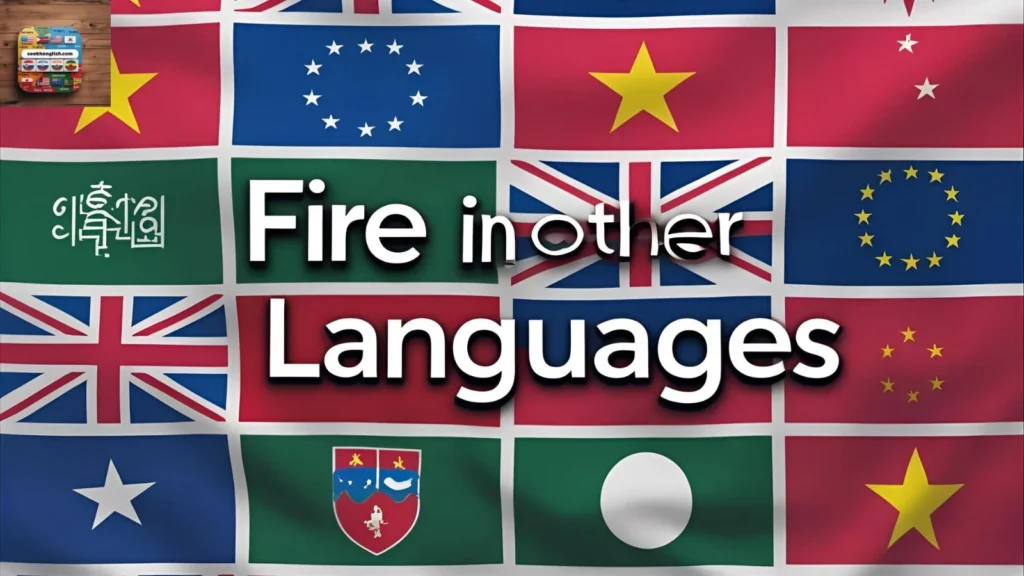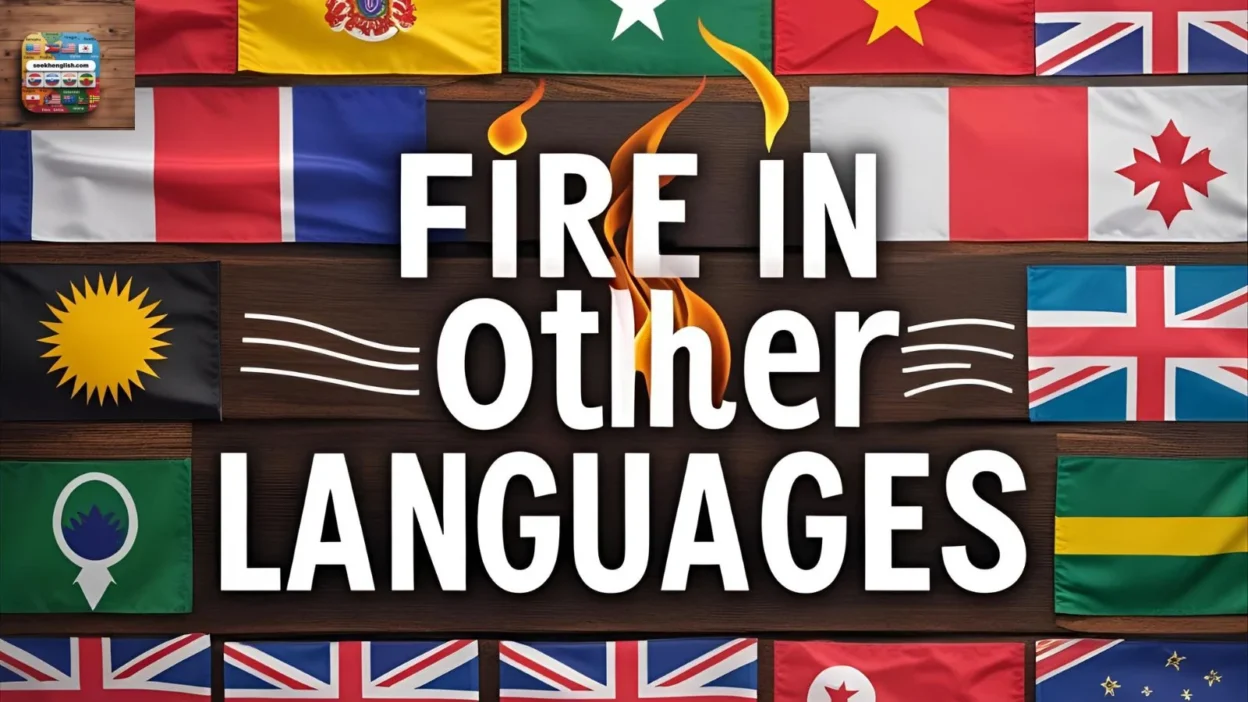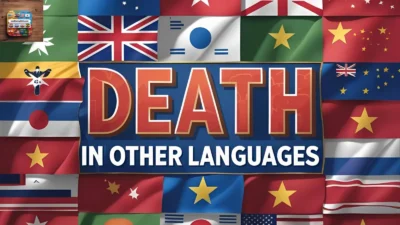Many people search for how to say “fire” in other languages for reasons like travel, learning, culture, or creativity. The word fire can mean heat, light, passion, or even danger, and it appears in stories, songs, and everyday speech across the globe. In this guide, you’ll discover how to say fire in over 85 different languages to help you connect with people and words from around the world. Fire in Other Languages
How to Say “fire” in 85 Different Languages

Below are 85 languages, each with country emoji, the translation of “fire”, a simple English‑style pronunciation, and an example sentence.
Read More: Red in Other Languages
- Afrikaans (🇿🇦) – vuur | Pronunciation: “foor”
• Example: Ek sien die vuur brand op die stoep. (“I see the fire burning on the porch.”) - Akan (🇬🇭) – ogya | “oh‑jya”
• Example: Ogya no yɛ den. (“The fire is strong.”) - Albanian (🇦🇱) – zjarrit | “zhar‑rit”
• Example: Zjarrit e ndezëm në oborr. (“We lit the fire in the yard.”) - Amharic (🇪🇹) – እሳት (isati) | “ee‑sat”
• Example: እሳት ብርሃን ማሰራት ይችላል። (“Fire can create light.”) - Arabic (🇸🇦) – نار (nar) | “nar”
• Example: النار قوية في الصحراء. (“The fire is fierce in the desert.”) - Armenian (🇦🇲) – կրակ (krak) | “krak”
• Example: Օրն ավարտվեց կրակի մոտ: (“The day ended by the fire.”) - Azerbaijani (🇦🇿) – yanğın | “yan‑gun”
• Example: Yanğın təhlükəli idi. (“The fire was dangerous.”) - Basque (🇪🇸) – sute | “soo‑teh”
• Example: Sua edo sute bat da. (“It is a fire or flame.”) - Belarusian (🇧🇾) – агонь (ahonʹ) | “a‑hon”
• Example: Агонь гарае моцна. (“The fire burns strongly.”) - Bengali (🇧🇩) – আগুন (agun) | “a‑goon”
• Example: আগুন ঝলমল করছে। (“The fire is glowing brightly.”) - Bhojpuri (🇮🇳) – आगि (agi) | “a‑gi”
• Example: आगि जल रहल बा। (“The fire is burning.”) - Bosnian (🇧🇦) – vatre | “va‑treh”
• Example: Vatre je jaka večeras. (“The fire is strong tonight.”) - Bulgarian (🇧🇬) – огън (ogŭn) | “o‑gun”
• Example: Огънът топли всички ни. (“The fire warms all of us.”) - Catalan (🇪🇸) – foc | “fok”
• Example: El foc crema les branques. (“The fire burns the branches.”) - Cebuano (🇵🇭) – kalayo | “ka‑la‑yo”
• Example: Kalayo nagsiga sa balay. (“The fire is burning in the house.”) - Chichewa (🇲🇼) – moto | “mo‑toh”
• Example: Moto ukufuna mpweya. (“The fire needs air.”) - Chinese (Simplified) (🇨🇳) – 火 (huǒ) | “hwaw”
• Example: 火 很 热。 (“The fire is very hot.”) - Chinese (Traditional) (🇹🇼) – 火 (huǒ) | “hwaw”
• Example: 我們圍著火坐。 (“We sit around the fire.”) - Corsican (🇫🇷) – focu | “fo‑koo”
• Example: U focu riscalda a sera. (“The fire warms the evening.”) - Croatian (🇭🇷) – vatra | “va‑tra”
• Example: Vatra svijetli noću. (“The fire shines at night.”) - Czech (🇨🇿) – oheň | “o‑hen”
• Example: Oheň praská v krbu. (“The fire crackles in the hearth.”) - Danish (🇩🇰) – brand | “brand”
• Example: Branden var stor i går. (“The fire was big yesterday.”) - Dutch (🇳🇱) – vuur | “foor”
• Example: Het vuur brandt fel. (“The fire burns brightly.”) - Esperanto (🌐) – fajro | “fye‑ro”
• Example: La fajro varmigas ĉion. (“The fire warms everything.”) - Estonian (🇪🇪) – tulekahju | “too‑leh‑kah‑hu”
• Example: Tulekahju oht on suur. (“The fire danger is great.”) - Filipino (Tagalog) (🇵🇭) – apoy | “ah‑poi”
• Example: Apoy ay mainit. (“Fire is hot.”) - Finnish (🇫🇮) – tuli | “too‑lee” (using “tuli” rather than idiomatic)
• Example: Tuli luo lämpöä. (“Fire creates warmth.”) - French (🇫🇷) – feu | “fe‑oo”
• Example: Le feu illumine la nuit. (“The fire lights up the night.”) - Frisian (🇳🇱) – fjoer | “fy‑oor”
• Example: Fjoer is waarm. (“The fire is warm.”) - Galician (🇪🇸) – lume | “loo‑meh”
• Example: O lume é brillante. (“The fire is bright.”) - Georgian (🇬🇪) – ცეცხლი (tsetskhli) | “tsets‑kh‑lee”
• Example: ცეცხლი აანთო ღამეს. (“He lit the fire at night.”) - German (🇩🇪) – Feuer | “foy‑er”
• Example: Das Feuer ist heiß. (“The fire is hot.”) - Greek (🇬🇷) – φωτιά (fotiá) | “fo‑tee‑AH”
• Example: Η φωτιά καίει δυνατά. (“The fire burns strongly.”) - Gujarati (🇮🇳) – આગ (aag) | “aag”
• Example: આગ ગરમ છે. (“The fire is hot.”) - Haitian Creole (🇭🇹) – dife | “dee‑feh”
• Example: Dife a chofe kay la. (“The fire heats the house.”) - Hausa (🇳🇬) – wuta | “woo‑ta”
• Example: Wuta tana ƙonewa. (“The fire is burning.”) - Hawaiian (🇺🇸) – ahi | “ah‑hee”
• Example: Ahi ke ahi i pō. (“The fire burns at night.”) - Hebrew (🇮🇱) – אֵשׁ (esh) | “esh”
• Example: האש בוערת. (“The fire is burning.”) - Hindi (🇮🇳) – आग (aag) | “aag”
• Example: आग जल रही है। (“The fire is burning.”) - Hmong (🇺🇸) – hluav taws | “hloo‑av taws”
• Example: Hluav taws kub heev. (“The fire is very hot.”) - Hungarian (🇭🇺) – tűz | “tooz”
• Example: A tűz világít. (“The fire is shining.”) - Icelandic (🇮🇸) – eldur | “el‑dur”
• Example: Eldur logar hátt. (“The fire flames high.”) - Igbo (🇳🇬) – ọkụ (ọkụ) | “oh‑koo”
• Example: Ọkụ dị ọkụ. (“The fire is hot.”) - Iloko (Ilocano) (🇵🇭) – apuy | “a‑pooy”
• Example: Apuy nagsilaw. (“The fire glowed.”) - Indonesian (🇮🇩) – api | “ah‑pee”
• Example: Api membakar kayu. (“The fire burns wood.”) - Irish (🇮🇪) – tine | “tih‑neh”
• Example: Tá an tine ag lasadh. (“The fire is burning.”) - Italian (🇮🇹) – fuoco | “fwaw‑ko”
• Example: Il fuoco scalda la stanza. (“The fire warms the room.”) - Japanese (🇯🇵) – 火 (hi) | “hee”
• Example: 火が明るい。 (“The fire is bright.”) - Javanese (🇮🇩) – geni | “geh‑nee”
• Example: Geni murub ing alas. (“The fire burned in the forest.”) - Kannada (🇮🇳) – ಬೆಂಕಿ (benki) | “ben‑kee”
• Example: ಬೆಂಕಿ ಉರಿಯುತ್ತಿದೆ. (“The fire is burning.”) - Kazakh (🇰🇿) – өрт (ört) | “urt”
• Example: Өрт үлкен болды. (“The fire was large.”) - Khmer (🇰🇭) – ភ្លើង (phleung) | “phloo‑ang”
• Example: ភ្លើង ហើយដ៏ក្តៅណាស់។ (“The fire is very hot.”) - Kinyarwanda (🇷🇼) – umuriro | “oo‑moo‑ri‑ro”
• Example: Umuriro uraka cyane. (“The fire burns hot.”) - Korean (🇰🇷) – 불 (bul) | “bool”
• Example: 불이 뜨겁다. (“The fire is hot.”) - Kurdish (Kurmanji) (🇹🇷) – agir | “ah‑gir”
• Example: Agir pir germ e. (“The fire is very hot.”) - Kyrgyz (🇰🇬) – от (ot) | “ot”
• Example: От жаркылдайт. (“The fire glows.”) - Lao (🇱🇦) – ໄຟ (fai) | “fai”
• Example: ໄຟ ແຮງ. (“The fire is strong.”) - Latin (🇻🇦) – ignis | “ig‑nis”
• Example: Ignis clarus est. (“The fire is bright.”) - Latvian (🇱🇻) – uguns | “oo‑guns”
• Example: Uguns silta ir. (“The fire is warm.”) - Lithuanian (🇱🇹) – ugnis | “oo‑g‑nis”
• Example: Ugnis dega naktį. (“The fire burned at night.”) - Luxembourgish (🇱🇺) – Feier | “fy‑er”
• Example: Feier leeft héich. (“The fire burns high.”) - Macedonian (🇲🇰) – оган (ogan) | “o‑gan”
• Example: Огaн гори яростно. (“The fire burns fiercely.”) - Malay (🇲🇾) – api | “ah‑pee”
• Example: Api membakar sampah. (“The fire burns garbage.”) - Malayalam (🇮🇳) – തീ (thee) | “thee”
• Example: തീ ചൂടാണ്. (“The fire is hot.”) - Maltese (🇲🇹) – nar | “nar”
• Example: In‑nar qed jipqajan. (“The fire is intense.”) - Maori (🇳🇿) – ahi | “ah‑hee”
• Example: Kei te tahu te ahi. (“The fire is burning.”) - Marathi (🇮🇳) – आग (āga) | “aag‑aa”
• Example: आग जागृत आहे. (“The fire is burning.”) - Mongolian (🇲🇳) – гал (gal) | “gal”
• Example: Гал халуун байна. (“The fire is hot.”) - Myanmar (Burmese) (🇲🇲) – မီး (mee) | “mee”
• Example: မီး နွေးပါတယ်။ (“The fire is warm.”) - Nepali (🇳🇵) – आगो (āgo) | “a‑go”
• Example: आगो बलिरहेको छ। (“The fire is burning.”) - Northern Sotho (🇿🇦) – mollo | “mo‑lo”
• Example: Mollo o tletse motlakase. (“The fire is filled with energy.”) - Norwegian (🇳🇴) – brann | “bran”
• Example: Brannen var farlig. (“The fire was dangerous.”) - Odia (Oriya) (🇮🇳) – ଅଗ୍ନି (agni) | “ag‑ni”
• Example: ଅଗ୍ନି ଦହନ କରୁଛି। (“The fire is burning.”) - Oromo (🇪🇹) – abidda | “a‑bid‑da”
• Example: Abidda garmii dha. (“The fire is hot.”) - Pashto (🇦🇫) – اور (ūr) | “oor”
• Example: اور ګرمه ده. (“The fire is hot.”) - Persian (🇮🇷) – آتش (ātash) | “aa‑tash”
• Example: آتش خیلی گرم است. (“The fire is very hot.”) - Polish (🇵🇱) – ogień | “oh‑gyen”
• Example: Ogień płonie jasno. (“The fire burns brightly.”) - Portuguese (🇵🇹) – fogo | “fo‑goo”
• Example: O fogo aquece a sala. (“The fire warms the room.”) - Punjabi (🇮🇳) – ਅੱਗ (aga) | “aag‑g”
• Example: ਅੱਗ ਬਹੁਤ ਗਰਮ ਹੈ। (“The fire is very hot.”) - Romanian (🇷🇴) – foc | “fok”
• Example: Focul arde lemne. (“The fire burns wood.”) - Russian (🇷🇺) – огонь (ogon’) | “o‑gon”
• Example: Огонь горит ярко. (“The fire burns brightly.”) - Samoan (🇼🇸) – afi | “ah‑fee”
• Example: O le afi e vevela. (“The fire is hot.”) - Sanskrit (🇮🇳) – अग्निः (agniḥ) | “ag‑nih”
• Example: अग्निः पवित्रता प्रदर्शयति। (“Fire shows purity.”) - Scots Gaelic (🇬🇧) – teine | “tay‑neh”
• Example: Tha teine blàth. (“The fire is warm.”) - Serbian (🇷🇸) – ватра (vatra) | “va‑tra”
• Example: Ватра гори јако. (“The fire burns strongly.”)
Conclusion
No matter where you go in the world, the word “fire” always carries warmth, energy, and respect.



